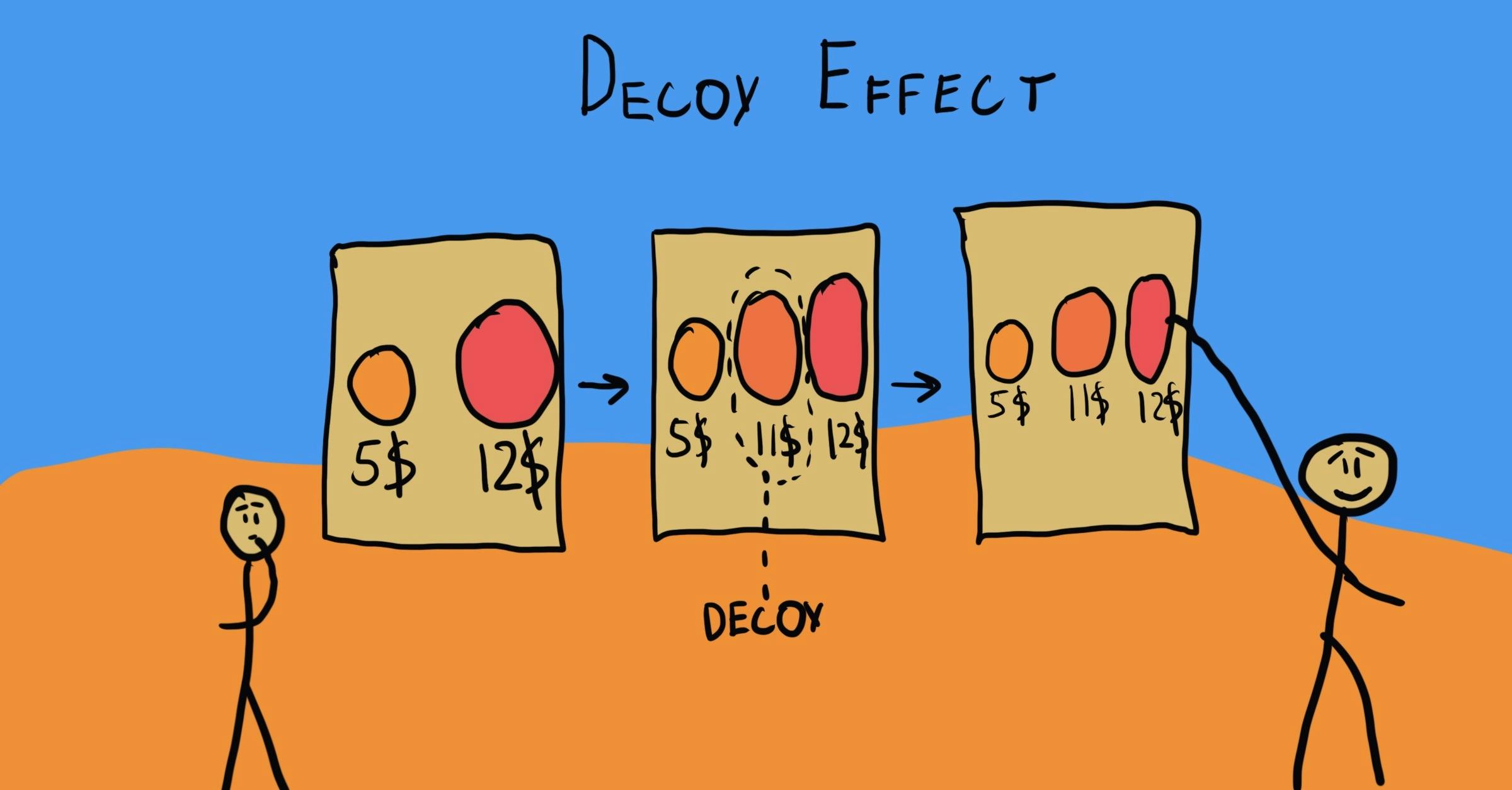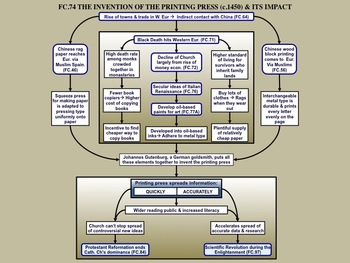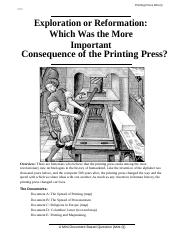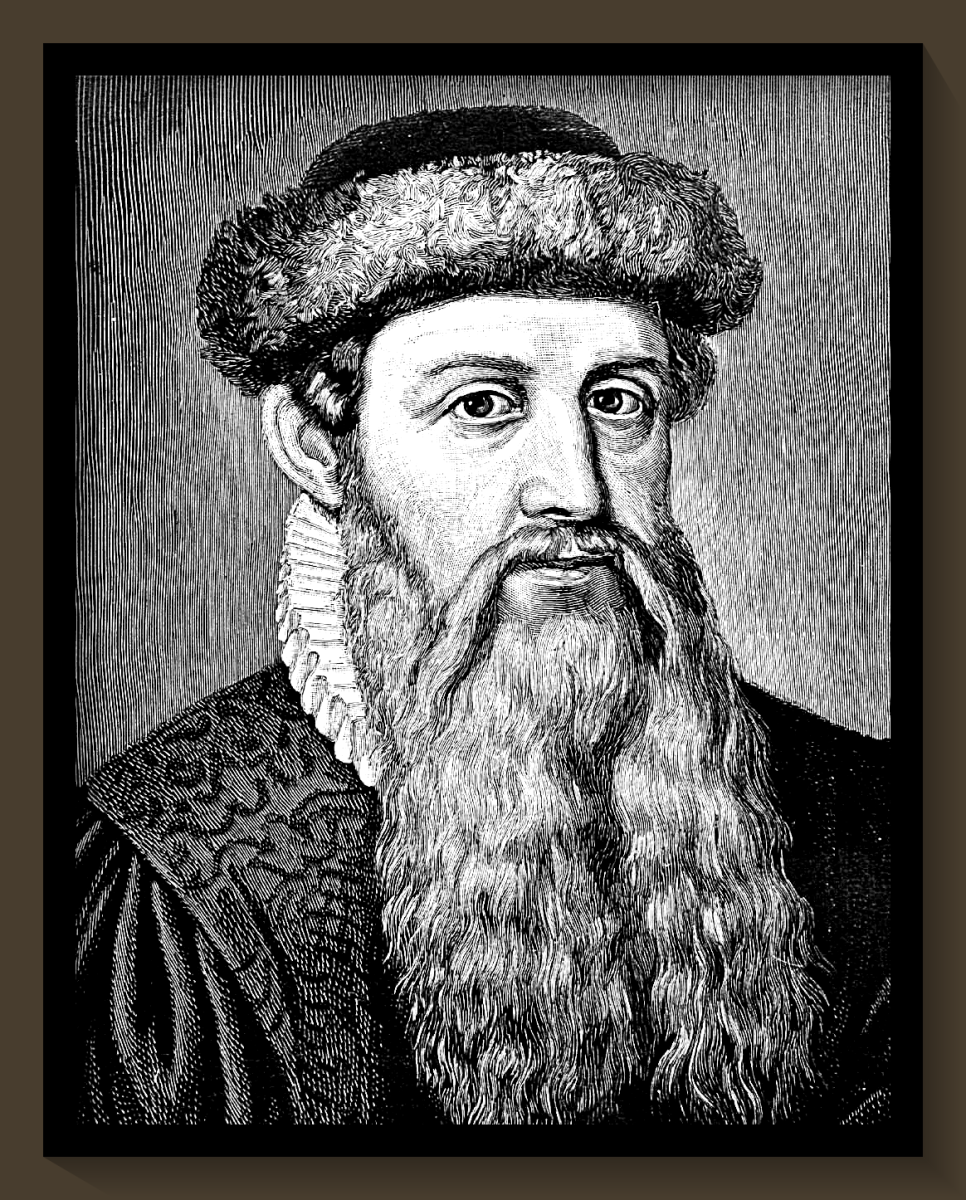The invention of the printing press in the mid-15th century had a profound and lasting impact on society, paving the way for the mass production and dissemination of knowledge, ideas, and information. It revolutionized the way in which books were produced and disseminated, making it possible to produce large numbers of identical copies quickly and inexpensively. This had a number of important consequences, both in terms of the spread of knowledge and in terms of the cultural and political changes it facilitated.
One of the most important consequences of the printing press was the democratization of knowledge. Prior to the invention of printing, books were produced by hand, and as a result, they were expensive and rare. Only the wealthy and powerful had access to them, and the majority of people were illiterate. With the advent of printing, books became more widely available and more affordable, making it possible for more people to become educated and informed. This, in turn, led to the emergence of a more educated and enlightened society, as people had access to a wide range of knowledge and ideas that had previously been beyond their reach.
The printing press also played a significant role in the spread of new ideas and the dissemination of information. Prior to the printing press, the spread of ideas and information was slow and limited, as it relied on word of mouth or handwritten copies. With the printing press, information could be disseminated more quickly and widely, leading to the spread of new ideas and the exchange of knowledge and information on a much larger scale. This played a key role in the development of the scientific revolution and the Enlightenment, as it facilitated the rapid exchange of ideas and the spread of new knowledge.
In addition to its impact on the spread of knowledge and ideas, the printing press also had a number of other important consequences. It contributed to the growth of a more literate society, as more people had access to books and were able to learn to read. It also facilitated the development of a more standardized form of language, as books were produced in a standardized format that made it easier for people to read and understand them. Finally, the printing press played a key role in the development of the modern nation-state, as it allowed for the production of standardized legal documents, maps, and other materials that were essential for the functioning of the state.
Overall, the invention of the printing press was one of the most important technological developments in human history, as it paved the way for the mass production and dissemination of knowledge, ideas, and information. Its impact was far-reaching and long-lasting, and it continues to shape the way we think and communicate to this day.
Utilitarianism is a moral theory that holds that the best action is the one that maximizes overall happiness or pleasure. It is a form of consequentialism, meaning that the moral value of an action is determined by its consequences. Proponents of utilitarianism argue that it provides a clear and objective way to determine right and wrong actions, and that it is the most effective way to promote the overall well-being of society.
However, utilitarianism has been subject to criticism on several grounds. One criticism is that it is overly focused on the consequences of actions, and does not take into account the moral intentions or motives behind those actions. For example, under utilitarianism, it might be considered morally acceptable to deceive someone if doing so leads to a net increase in happiness. This ignores the importance of honesty and trust in human relationships, and could lead to a society in which people are constantly scheming to achieve their own ends at the expense of others.
Another criticism of utilitarianism is that it is difficult to measure and compare the happiness or pleasure of different individuals. How can we accurately compare the pleasure of one person's vacation with the pleasure of another person's job promotion? Utilitarianism also ignores the fact that people have different values and priorities, and what brings one person happiness may not bring happiness to another.
A third criticism of utilitarianism is that it ignores the inherent value of individual human beings. Under utilitarianism, the value of a person is determined solely by their ability to contribute to overall happiness. This could lead to the exploitation and mistreatment of certain individuals or groups if their happiness is deemed less important than that of others.
Finally, utilitarianism does not account for long-term consequences or the needs of future generations. An action that maximizes happiness in the present may have negative consequences for the future, such as environmental degradation or economic instability.
Overall, while utilitarianism provides a useful framework for evaluating the consequences of actions, it has significant limitations and is not a sufficient moral theory on its own. It is important to consider the intentions behind actions, the inherent value of human beings, and the long-term consequences of our actions in addition to the happiness they may bring in the present.
The printing press, invented by Johannes Gutenberg in the mid-15th century, revolutionized the way in which information was disseminated and played a crucial role in shaping the modern world. Its most significant consequence was the proliferation of knowledge and the democratization of information.
Before the printing press, books were hand-copied by monks and were thus extremely rare and expensive. This meant that access to knowledge was limited to a small elite group of scholars and religious leaders. With the advent of the printing press, however, books could be produced much more quickly and inexpensively, making them accessible to a wider audience.
The impact of this increased accessibility was tremendous. It allowed for the spread of new ideas and the dissemination of information on a much larger scale than ever before. This had far-reaching consequences, including the Protestant Reformation, the Scientific Revolution, and the Enlightenment.
The Protestant Reformation, which began in the early 16th century, was a major religious and cultural movement that challenged the authority of the Catholic Church. The printing press played a crucial role in the spread of Protestant ideas, as it allowed for the rapid dissemination of Protestant texts, such as Martin Luther's Ninety-Five Theses. This contributed to the proliferation of Protestantism and the eventual splintering of the Catholic Church.
The Scientific Revolution, which occurred in the 17th century, marked a major turning point in the way in which people understood the world around them. The printing press allowed for the rapid dissemination of new scientific ideas, such as the theories of Copernicus and Galileo, which challenged traditional beliefs about the natural world. This contributed to the development of modern science and the establishment of the scientific method.
The Enlightenment, a philosophical movement that took place in the 18th century, emphasized reason, individualism, and the power of human knowledge. The printing press played a crucial role in the spread of Enlightenment ideas, as it allowed for the rapid dissemination of texts by philosophers such as John Locke and Immanuel Kant. This contributed to the development of modern democracy and the belief in the inherent value of the individual.
Overall, the most important consequence of the printing press was the proliferation of knowledge and the democratization of information. It allowed for the rapid dissemination of new ideas and contributed to significant cultural, religious, and philosophical movements that have shaped the modern world.








